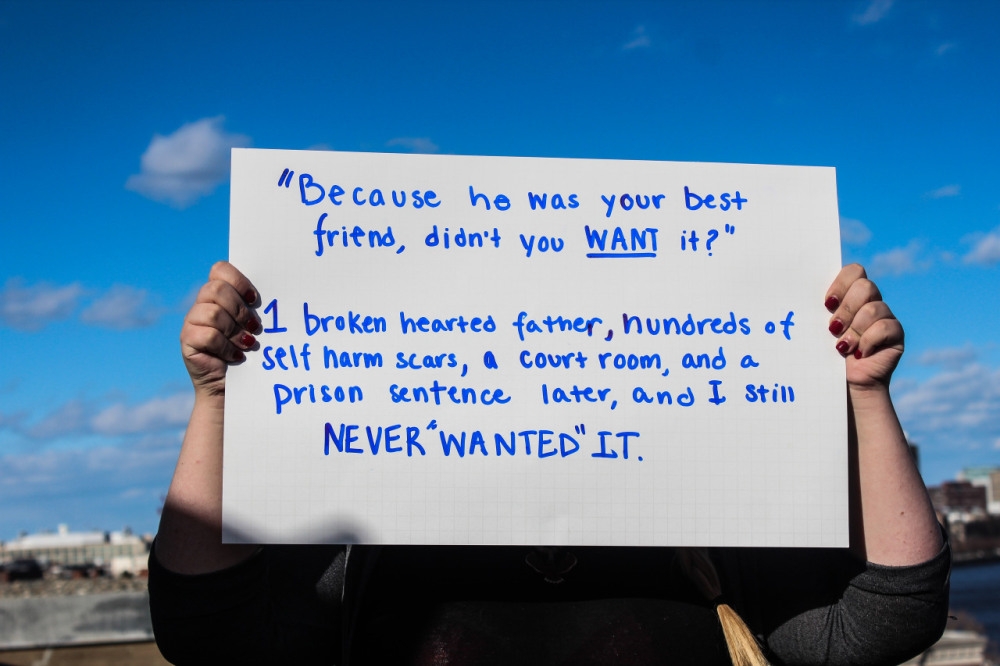For as long as I can remember, I have been a keeper of stories.
Often, in a waiting room, a dentist’s chair, on a plane, or in a classroom, a stranger will open up to me and share personal stories, some of which are about deeply painful traumatic experiences. It’s a role I treasure and have willingly taken on throughout my life beyond those planes and waiting rooms, first as a sexual assault crisis counselor and, since 2013, through starting Surviving in Numbers, an organization that helps domestic and sexual violence survivors safely share their stories. In turn, I’ve often related to myself as responsible to hold others’ traumas, but kept my own hidden.
After I was sexually assaulted during the fall of my senior year of high school, this shifted; I felt voiceless, scared, powerless, and I needed someone to hear and hold my story. I turned to only a few friends and my brother for support. Eventually, everyone I told about my perpetrator had their own bad experience with him: he’d assaulted a different friend of theirs, he’d harassed someone they knew, or they’d been bullied by him themselves. This horrifying repeat-offender context meant I was lucky enough to be automatically believed.
I call it lucky because this is not the experience for most survivors: while an estimated 60-80% of survivors never report their assaults to law enforcement, more painful to sit with is that many survivors never tell anyone in their lives, for fear of being disbelieved, shamed, treated differently, or retaliated against by their assailant or assailant’s friends.
Young survivors in particular often struggle with this silence, as well as with peers or others in their lives who don’t know how to respond to disclosures in a positive way, in part because culturally, we often avoid discussing the prevalence of sexual violence among teens. Despite our hesitance to address it, the fact remains: 44% of sexual violence victims are under the age of 18, and 1 in 3 teens has been physically, emotionally or sexually abused by a dating partner. Even if we already think we’re getting it right, we can always do a better job of supporting these teens — but how?
1) You’re not alone
Many people (teens, adults) don’t realize how often this happens, and may then feel isolated in their experience. Over the past 2 years, I’ve taught over 1,000 high school students on basic facts about sexual violence, debunking common myths about violence, story-sharing, how to support peers who disclose, how to identify supportive people they could disclose to, and how to step in effectively if they witness violence (harassment to assault).
A common response I often hear after these workshops is, “Before you came in to speak, I didn’t know of anyone else who’d been sexually assaulted.” If young people feel alone in their experience, they often feel ashamed and worry no one else will understand. Don’t wait until you hear someone disclose an assault to start talking about sexual violence — talking about it openly and early helps teens understand that violence shouldn’t be ignored, and is never a survivor’s fault.
2) I believe you
While the needs of survivors are intricate and all survivors have different needs, the best thing you can do for any survivor who discloses their story is to let them know you believe them and will support them in any way they need. We often worry about needing to find the perfect thing to say to a survivor, but sometimes, the perfect thing is as simple as letting them know you believe them. If we want survivors to share their stories, they need to know they’ll be safe doing so. If they aren’t believed, it can be devastating: as one survivor shared, “The first person I told asked me, ‘Why did you allow it to happen?’ which hurt just as bad.”
3) It is absolutely not your fault
One of the toughest pieces of workshops I run involves debunking myths around sexual violence. These myths are so deeply ingrained in our culture that we may not even realize we believe them, and they are incredibly harmful to victims and to all of us. When we live in a culture where people believe and don’t challenge the idea that what someone is wearing can “provoke” someone to assault them, or that waiting to report an assault means that person is making it up, we all suffer.
In class, I provide a safe space to openly discuss these ideas so that we can work through them together; without addressing the myths, those teens who unknowingly or knowingly blame victims go on to become adults who also blame victims. “Raise your hand if you believe someone can be ‘asking’ to be assaulted,” I’ll pose to the class. More than once, a student has raised their hand, and it’s a terrible moment to see a piece of victim-blaming culture already instilled in someone so young. However, more than once, another student’s hand has gone up after: “No one is ever asking for it.” “Just because someone wears something, doesn’t mean they want to have sex.”
In order to change bad cultural norms, we must stop accepting them: whether you’re a young person or an adult, it’s crucial for people of any age to be challenged on these harmful ideas.
4) I will support whatever choice you make
We may feel very strongly about what a survivor, especially a teen survivor, should do after disclosing being assaulted. Commonly, these “should”s are around reporting: a survivor should go to the police, to the hospital, to their parents, or to a counselor. That choice must be the survivor’s. Not every survivor ever wants to report or take any kind of action, and that is perfectly fine.
Survivors have very valid reasons for not wanting to report, especially to law enforcement, who are part of a legal system where punishment rates are low in a system that is not designed to support survivors. Some survivors may not want to have their assailants punished, may be afraid of their assailant retaliating against them and hurting them further, and some survivors may just want to move on and not be forced to re-tell and re-visit their story dozens of times in a precinct or courtroom. Whatever decision a survivor makes is truly okay, and we need to actively let survivors know we will support whatever choice they make.
Survivors deserve all the love and care we can provide them. We don’t have to be superheroes – by holding a survivor’s story, listening to what a survivor wants and showing a survivor we support them unconditionally, we can make an enormous difference.

